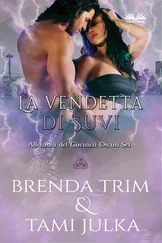Calligaris nodded. ‘Good, so we eat, and then we will talk some more.’
Don Ceriano released me and I went out back to the kitchen. I sat there while people rushed around me carrying food through to the dining room. My mouth was as dry as copper filings. I felt a burning tension in my chest. There were people out there in the world who knew my name, knew of the things I had done, and these were people I would not have recognized had I walked past them in the street, had I sat beside them in a bar. The thought frightened me, and since I had become a stranger to fear it was a moment that I would think of for many years to come. It was a moment that marked a change for me, a change of direction, a change of lifestyle, but only later would I realize how significant it was. For now, for that brief time, I sat silently in the kitchen while Don Ceriano, Fabio Calligaris and Carlo Evangelisti, perhaps the three most powerful men I had ever known, sat and ate antipasta no more than ten feet away.
That night, darkness pressing against the walls of my room, the sound from the street beyond nothing more than a murmur of endless traffic through the city of Las Vegas, I looked back and asked myself what I had become. I thought of my mother, how cruelly and unnecessarily she had died, and also of my father, the Havana Hurricane, and the way he had looked at me in that alleyway when he knew his death had arrived by the hand of his own son. I did not cry for him. I could not. But for her, for everything she was before my father, for everything she would have become had she not chosen to marry him… for her I shed a tear. It came back to family. Always to family. It came back to blood and loyalty and the strength of a promise. These people, these Italians, were not my family. I was all that existed of my own bloodline, and with my death would come the death of everything that my mother had wanted for me. It was perhaps then that my thoughts turned to a family of my own, and how family was strength and passion and a sense of pride in creating something that was an extension of one’s self. I went to sleep with that thought, and though the next day would augur greater change than ever I could have imagined, nevertheless the seed had been planted. And it would grow; with time it would grow, and the more it grew the less space I had left to allow for any other thoughts. What happened in the coming weeks I allowed to happen for that reason, for never once did I believe that I would find what I was looking for in that house on Alvarado.
Now, in hindsight, I seem to remember the following day with greater and greater clarity, as if such hindsight has given me the advantage of perspective. Sometimes Don Ceriano would say Ernesto, you say too little and think too much , but closer to the truth was that I thought rarely, if at all. I was not then, and never have been, an introspective man. Perhaps my life did not permit me the luxury of contemplation, for to consider the things that I had done, the people I had killed, the path I had chosen, would have been too painful. Now – older, perhaps a little wiser – I possibly would have made different choices. Certainly not the killing of my father, for even with older, wiser eyes I can see there was no other way. I could not have stood by and let someone else kill him. That would not have been justice. Guilty of the death of my mother, guilty of torturing her for so many years before, I had to kill him myself. And the others? Well, I was a good soldier, a member of the Italian family, but perhaps no more than some inbred distant cousin who appeared only when there was work to do that no-one else would undertake. I do not know, and now I do not care to know. By the time I was old enough to see these things for what they were I was too old to do anything about them. It was what it was. The past was the past, and there was nothing I could say or do to change it.
That day, the day after the arrival of Fabio Calligaris and Carlo Evangelisti, was a watershed. As I came down to the breakfast table that morning I perceived a presence in the room that I had felt before. It was the presence of death. Death carries a shadow. It waits, it lingers for some certain moment, and then it takes what it has come for swiftly, most often silently, always completely. Don Giancarlo Ceriano, a man who had been my father since February 1960 and the death of Don Pietro Silvino, a man who had schooled me in the ways of the world for the better part of fifteen years, carried about him that shadow of death.
‘Ernesto… you slept well?’ he asked.
I nodded. ‘Yes, Don Ceriano… I slept well.’
He smiled. ‘So today is a big day, a day for the future,’ he said. He buttered a crust of ciabatta and proceeded to dip it in a bowl of espresso. Don Ceriano was a man of some urgency perhaps; often he would scan the newspaper while eating, to his right an ashtray with a burning cigarette which he would retrieve and draw from periodically; in front of him the TV would be playing, and in the background someone would be discussing with him the details of some aspect of their work. He could do these things simultaneously, as if he possessed insufficient time to do each of them in turn. As a younger man I believed he had a mind the size of America; in later years I realized that this was the only way he could crowd out the sound of his conscience.
‘My friends Don Carlo and Don Fabio will return shortly. We will once more go over the details of the Chicago family’s interests in our business here in Las Vegas. This will be a fortuitous year for us, I believe, a very fortuitous year indeed.’
I didn’t want to eat; I could not eat. I poured a cup of coffee, I lit a cigarette, I listened patiently while Don Ceriano spoke of how things would be better once Sam Giancana’s people were here to assist in the management of the business. I did not believe a word of it. I cannot explain how, but somehow all of Don Ceriano’s words, words that he had been given by Don Calligaris and Don Evangelisti, seemed transparent. They seemed of a different color to the air in the room, or perhaps they carried beneath them the shadow of death. I did not try to understand why I knew what would happen, but I knew it, knew it with all my heart. I understood, even then, that I would take whatever action I had to in order to preserve my own life. I believed that it was not only for myself that I wished to survive, but for the memory of my mother. If I died, then there would be nothing left of her. Nothing at all. This I could not allow to happen, and so I decided – against all judgement and loyalty, against all conscience and honor – that I would walk from this day regardless of what might happen to Don Ceriano. He was not my family. I was my family. Myself and the memory of my mother.
Later, an hour perhaps, Don Calligaris and Don Evangelisti returned. They came with boxes of cigars, with bottles of vintage armagnac, and flowers for Don Ceriano’s house. Soon the place was rich with the aroma of smoke and spirit and summer. I went to the kitchen and attended to nothing but my own sense of unease and anticipation, and it was not long before Don Ceriano came through, already half-drunk before noon, and told me that he would be going out with Fabio and Carlo to see some of the business enterprises and casinos. Calligaris was behind him in a second. He insisted I accompany them, and once again his voice, like something dead being dragged across the floor, and his eyes, that seemed to command both respect and fear, left nothing I could do to refuse his insistence.
We took Don Ceriano’s car. Don Ceriano drove, beside him Carlo Evangelisti, myself and Don Calligaris in the back. We drove for an endless time, it seemed, but the streets were still familiar and so we could not have traveled for very long. Don Ceriano spoke incessantly. I wanted to tell him to shut up, that he would need all his energy to fight against what would inevitably come, and when he asked questions of me there was nothing I could do but murmur an affirmative or a denial.
Читать дальше
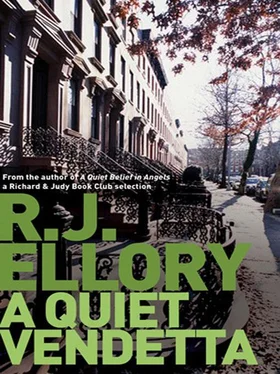
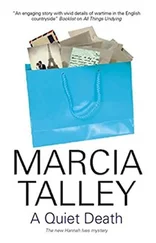
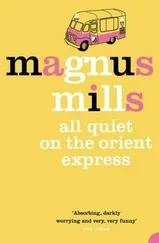


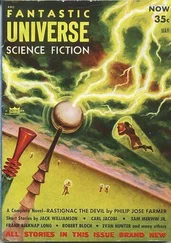

![Quiet Billie - Don't mistake the enemy [СИ]](/books/421973/quiet-billie-don-t-mistake-the-enemy-si-thumb.webp)

